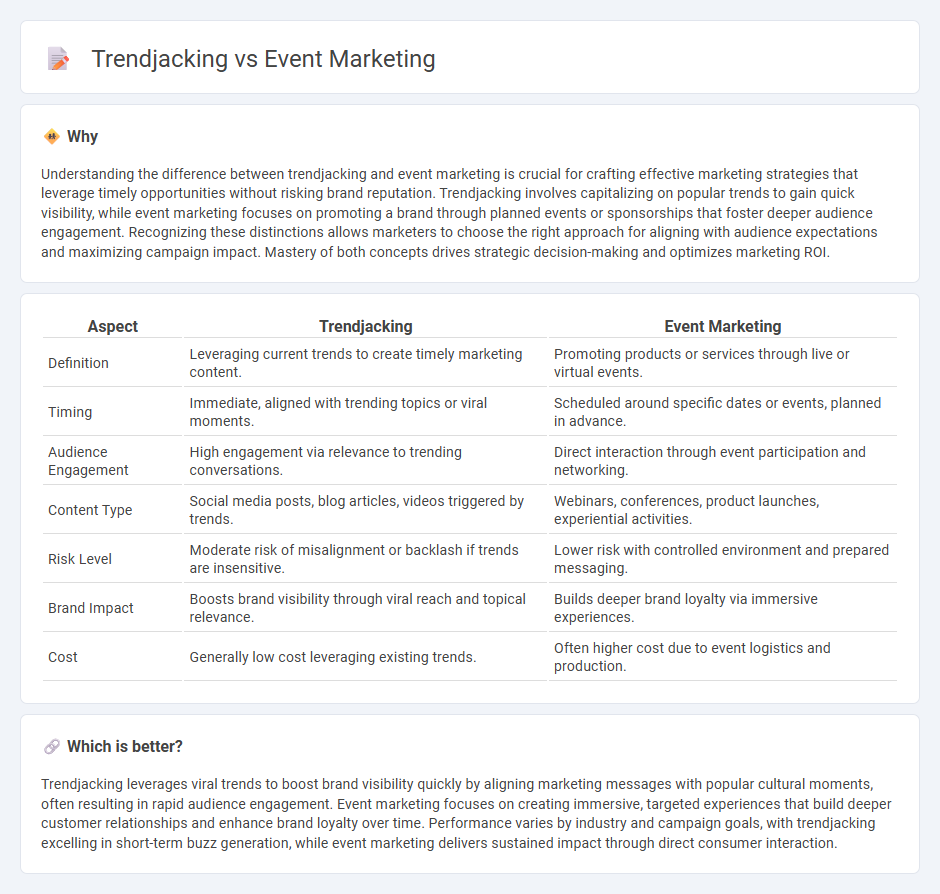
Trendjacking leverages current viral topics to create timely, relevant marketing campaigns that capture audience attention quickly. Event marketing focuses on planning and executing branded experiences during specific occasions to build deeper engagement and brand loyalty. Explore more to understand how integrating both strategies can amplify your marketing impact.
Why it is important
Understanding the difference between trendjacking and event marketing is crucial for crafting effective marketing strategies that leverage timely opportunities without risking brand reputation. Trendjacking involves capitalizing on popular trends to gain quick visibility, while event marketing focuses on promoting a brand through planned events or sponsorships that foster deeper audience engagement. Recognizing these distinctions allows marketers to choose the right approach for aligning with audience expectations and maximizing campaign impact. Mastery of both concepts drives strategic decision-making and optimizes marketing ROI.
Comparison Table
| Aspect | Trendjacking | Event Marketing |
|---|---|---|
| Definition | Leveraging current trends to create timely marketing content. | Promoting products or services through live or virtual events. |
| Timing | Immediate, aligned with trending topics or viral moments. | Scheduled around specific dates or events, planned in advance. |
| Audience Engagement | High engagement via relevance to trending conversations. | Direct interaction through event participation and networking. |
| Content Type | Social media posts, blog articles, videos triggered by trends. | Webinars, conferences, product launches, experiential activities. |
| Risk Level | Moderate risk of misalignment or backlash if trends are insensitive. | Lower risk with controlled environment and prepared messaging. |
| Brand Impact | Boosts brand visibility through viral reach and topical relevance. | Builds deeper brand loyalty via immersive experiences. |
| Cost | Generally low cost leveraging existing trends. | Often higher cost due to event logistics and production. |
Which is better?
Trendjacking leverages viral trends to boost brand visibility quickly by aligning marketing messages with popular cultural moments, often resulting in rapid audience engagement. Event marketing focuses on creating immersive, targeted experiences that build deeper customer relationships and enhance brand loyalty over time. Performance varies by industry and campaign goals, with trendjacking excelling in short-term buzz generation, while event marketing delivers sustained impact through direct consumer interaction.
Connection
Trendjacking leverages current viral trends to amplify brand exposure, while event marketing creates targeted experiences centered around specific occasions. Both strategies harness timely cultural or social moments to engage audiences and boost brand visibility. Integrating trendjacking into event marketing campaigns enhances relevance and drives higher consumer interaction by aligning messaging with prevailing interests.
Key Terms
**Event Marketing:**
Event marketing leverages live or virtual events to create direct engagement, brand awareness, and memorable experiences for target audiences, utilizing tactics such as product launches, trade shows, and experiential activations. It builds long-term customer relationships by fostering personal interaction and real-time feedback, optimizing brand loyalty and conversion rates. Explore more about how event marketing strategies drive impactful consumer connections and maximize marketing ROI.
Activation
Event marketing drives brand engagement by creating immersive experiences that captivate targeted audiences at specific occasions, boosting long-term loyalty and sales. Trendjacking leverages viral, real-time cultural phenomena to rapidly increase visibility and relevance but risks short-lived attention without meaningful activation strategies. Discover how integrating both techniques can maximize activation effectiveness and elevate your marketing impact.
Sponsorship
Event marketing leverages strategic sponsorships to build brand presence through direct audience engagement at targeted events, fostering loyalty and awareness. Trendjacking exploits current viral topics by aligning sponsorship messages with popular trends, rapidly capturing audience interest but often with short-lived impact. Explore detailed strategies to maximize sponsorship effectiveness in both event marketing and trendjacking for your brand.
Source and External Links
What is Event Marketing: Key Concepts, Proven Strategies ... - Eventtia - Event marketing is a strategy to connect with your audience by creating memorable events like conferences or workshops that showcase your brand, educate attendees, and generate engagement and buzz around your product or service.
Event Marketing: Strategy Guide + Tips - Adobe Experience Cloud - Event marketing involves developing themed exhibits or presentations to promote a product, service, or brand, supported by tactics like remarketing, content marketing, and social media campaigns to drive event attendance and maximize impact.
What is Event Marketing? Definition, Benefits, and... | ActiveCampaign - Event marketing is the creation and execution of events (in-person, virtual, or hybrid) designed to promote products or brands, offering benefits like interactive engagement, lead generation, brand awareness, and fostering customer loyalty.
 dowidth.com
dowidth.com